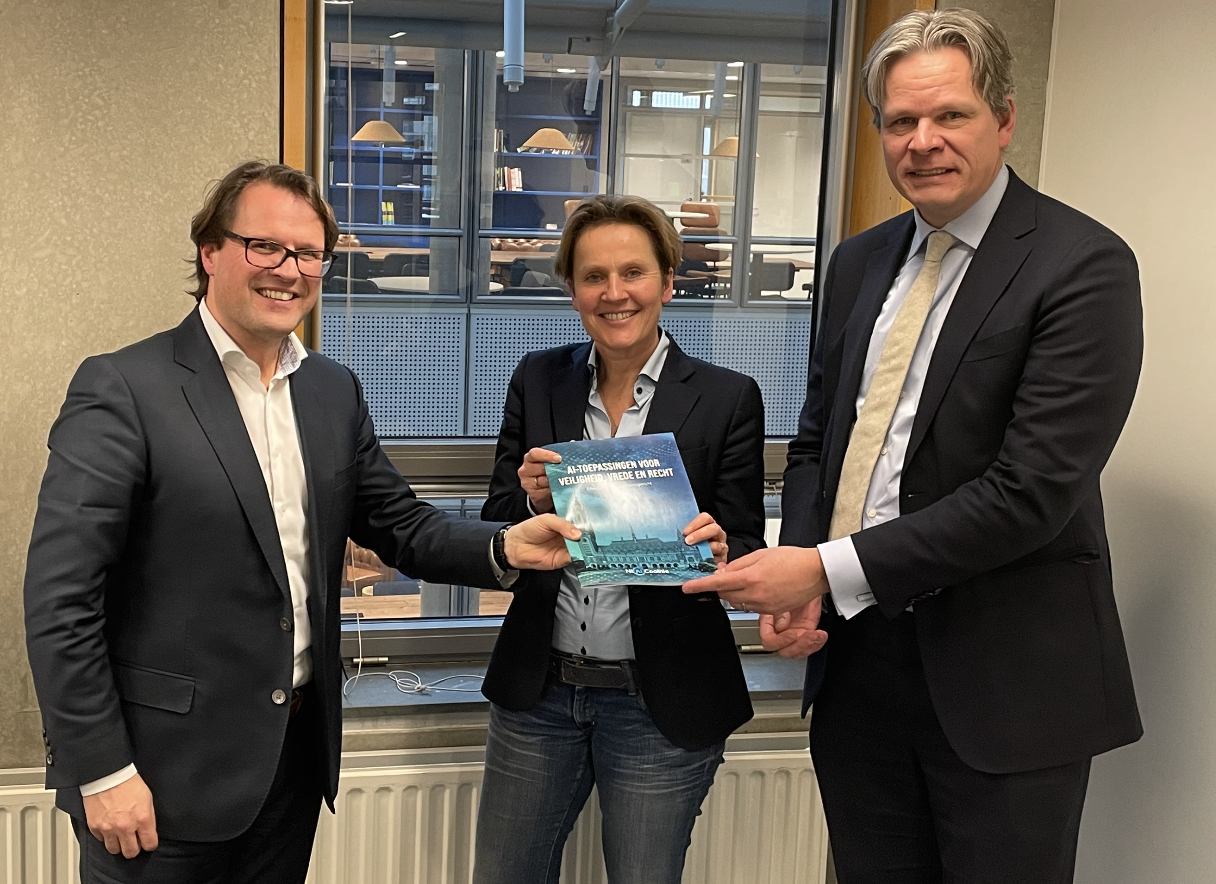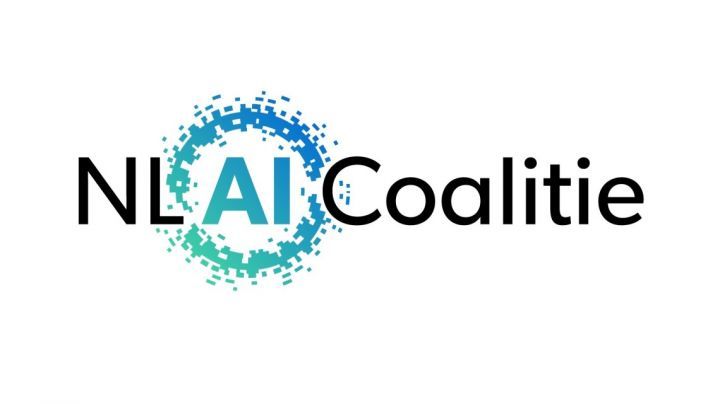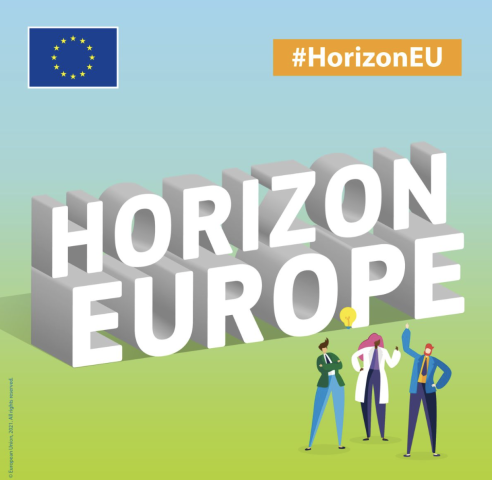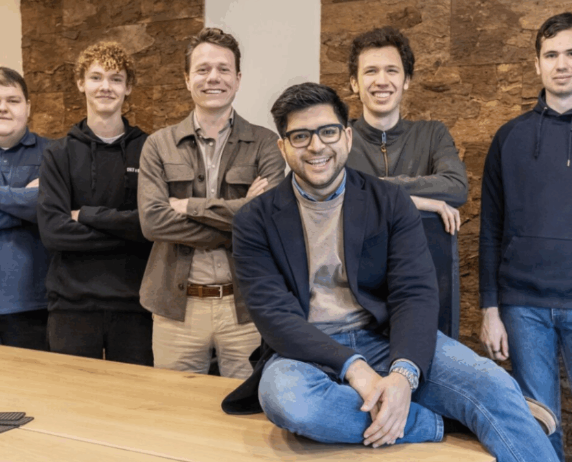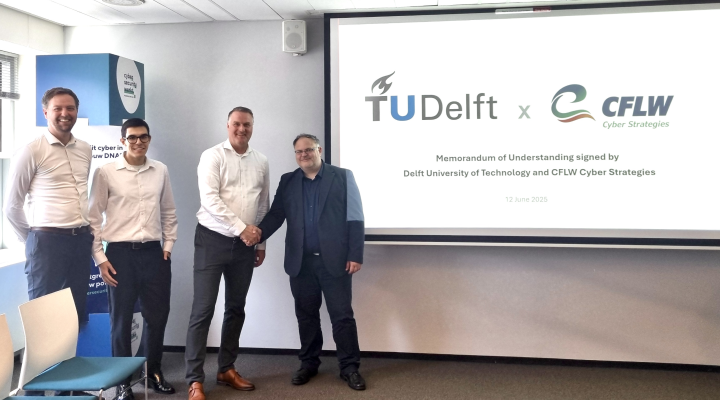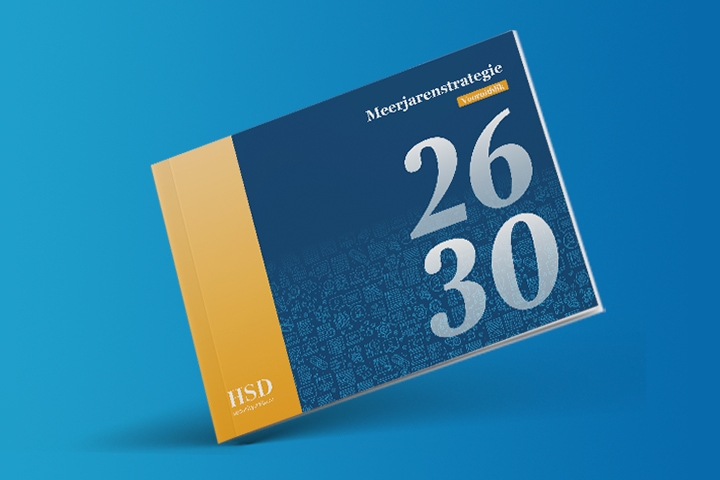Position Paper AI-applications for Security, Peace and Justice
On February 17 during the HSD Café, the position paper AI-application for Security, Peace and Justice (VVR) was presented and handed over to Annemiek Nelis (Director of Innovation, Knowledge and Strategy at the Ministry of JenV) and Michel van Leeuwen (Director of Artificial Intelligence at JenV). The paper provides insight into this playing field so that parties can find each other better, coordinate and collaborate on content and results. The paper is written by Security Delta (HSD) and the Dutch AI Coalition (NL AIC) in close collaboration with the Security, Peace and Justice working group on behalf of the Ministry of Justice and Security.
Joris den Bruinen, chair of programme team NLAIC & work group VVR and director of Security Delta (HSD): "Unfortunately, security, peace and justice are not always obvious. Threats continue to grow and both our physical and digital security is under pressure. Artificial Intelligence is playing an increasingly important role in the protection against these threats and guaranteeing justice, but at the same time this also entails risks. Which preconditions are involved and how can we come to an effective, secure and human centered approach to these applications?"
The Security, Peace and Justice working group of the Dutch AI Coalition wrote a paper on this field and what they are collaborating on, in concrete terms. This includes recognition on the crossovers between AI, data sharing, intelligence and (cyber)security, Privacy Enhancing Technologies and talent as important preconditions. As well as utilising Ethical Legal Social Aspects (ELSA) labs for a practice-oriented approach in algorithm development. Also, the application of AI with a balance between what is technically possible, legal and accepted and ethically and sociably desirable when establishing AI in the broad domain of security.
Data collaboration in the fight against crime
One of the included use cases is the use of multi-party computation (MPC) technology from Roseman Labs to generate and share collaborative data insights without revealing the actual data. Various actors in the detection and assistance chain of human trafficking have valuable information that cannot be shared. Yet, the need to collaborate is great. Roseman Labs and Sustainable Rescue together with a number of knowledge institutions, are using this technique to detect and tackle human trafficking more quickly both at a national and European level.
Synthetic Data use case
By generating synthetic data by Syntho, privacy sensitive information can be replaced by new and artificial data which is generated by an algorithm. This way, the date can be used for all kinds of purposes, without violating people’s privacy. Together with NL AIC and SAS, Syntho conducted research into what added value this data can offer and when it can best be used.
Marlou Snelders, Innovation Liaison at Security Delta (HSD) and coordinator of the VVR working group: "These use cases show that there are already good working secure AI-applications and that it is important now to look at governance. Because only if this technology fits into the balance of offering security in relation to privacy and ethics, the potential can be exploited and looked at scaling up (inter)nationally, in order to achieve the desired social effect and economic return."
Read the position paper in Dutch
Read the position paper in English
Read the interview with Paul Fockens (Sustainable Rescue Foundation) and Joris den Bruinen (HSD & NLAIC).
--------------------------------------------------------------
In Dutch
Position Paper AI-toepassingen voor Veiligheid, Vrede en Recht
Op 17 februari is tijdens het HSD Café de position paper AI-toepassingen voor Veiligheid, Vrede en Recht (VVR) gepresenteerd en overhandigd aan Annemiek Nelis (Directeur Innovatie, Kennis en Strategie bij het Ministerie van JenV) en Michel van Leeuwen (directeur Artificiële Intelligentie bij JenV). De paper geeft inzicht in het speelveld zodat partijen elkaar nog beter kunnen vinden, afstemmen en samenwerken op inhoud en resultaat. De paper is geschreven door Security Delta (HSD) en de Nederlandse AI Coalitie (NL AIC) in nauwe samenwerking met de werkgroep Veiligheid, Vrede en Recht in opdracht van het ministerie van Justitie en Veiligheid.
Joris den Bruinen, voorzitter programmateam NLAIC & werkgroep VVR en directeur Security Delta (HSD):” Veiligheid, Vrede en Recht zijn helaas niet altijd vanzelfsprekend. Dreigingen groeien en zowel onze fysieke als digitale veiligheid staat onder druk. Artificiële Intelligentie speelt een steeds grotere rol in de bescherming tegen deze dreigingen en het waarborgen van het recht, maar tegelijkertijd brengt deze inzet ook risico's met zich mee. Welke randvoorwaarden komen daarbij kijken en hoe komen we tot een effectieve, veilige en mensgerichte aanpak van deze toepassingen?”
De werkgroep Veiligheid, Vrede en Recht van de Nederlandse AI Coalitie schreef een paper over dit speelveld en wat ze gezamenlijk concreet aan het doen zijn. Hierin is onder meer aandacht voor de crossovers tussen AI, data delen, intelligence en (cyber)security, Privacy Enhancing Technologies en talent als belangrijke randvoorwaarden. Ook het benutten van Ethical Legal Social Aspects (ELSA) labs voor een praktijkgerichte aanpak in de ontwikkeling van algoritmes. En de toepassing van AI met een balans tussen wat technisch mogelijk is, juridische kan en mag en ethisch en maatschappelijk gewenst is bij de inzet van AI in het brede domein van veiligheid.
Data-samenwerking in strijd tegen criminaliteit
Een van de opgenomen use cases is de inzet van multi-party computation (MPC) technologie van Roseman Labs om gezamenlijke data inzichten te genereren en te delen zonder de data te hoeven onthullen. Diverse actoren in de opsporings- en hulpketen van mensenhandel hebben waardevolle informatie die niet gedeeld kan worden met anderen. Toch is de behoefte om samen te werken groot. Roseman Labs en Sustainable Rescue samen met enkele kennisinstellingen, zetten deze techniek in om mensenhandel op zowel nationaal als Europees niveau sneller op te kunnen sporen en aan te pakken.
Synthestische Data use case
Door het genereren van synthetische data door Syntho kan privacygevoelige informatie vervangen worden door nieuwe en kunstmatige data dat door een algoritme gegenereerd is. Zo kan de data gebruikt worden voor allerlei doeleinde, zonder dat de privacy van mensen wordt geschonden. Samen met NL AIC en SAS deed Syntho onderzoek naar welke toegevoegde waarde deze data kan bieden wanneer deze het best ingezet kan worden.
Marlou Snelders, Innovation Liaison bij Security Delta (HSD) en coördinator van de werkgroep VVR: “Deze use cases laten zien dat er al goed toepasbare veilige AI-toepassingen bestaan en dat het nu belangrijk is om naar de governance te kijken. Want alleen als deze techniek past in de balans van het bieden van veiligheid in relatie tot privacy en ethiek kan de potentie benut worden en gekeken worden naar (inter)nationale opschaling..Om zodoende te komen tot gewenst maatschappelijk effect en economisch rendement.”

